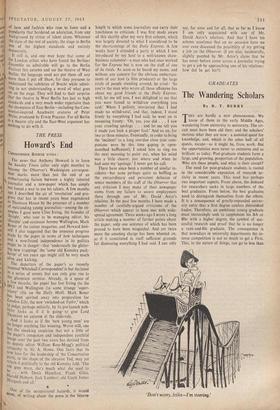THE PRESS
Howard's End
CHRISTOPHER BOOKER writes : The news that Anthony Howard is to leave the Sunday Times (after only eight months) to become the Observer's Washington correspon- dent Marks more than just the end of an embarrassing liaison be.tween a highly talented Journalist and a newspaper which has simply not found a way to use his talents. A few months ago described the air of 'revolution' and pro- gress that has in recent years been engendered Ill Thomson House by the presence of a number of outstanding young journalists—among the ex- amples I gave were Clive Irving, the founder. of 'Insight,' who rose to be managing editor, his 'disciple' and successor Jeremy Wallington, Mark Boxer of the colour magazine, and Howard hint- self. I also suggested that the immense progress made by the paper in terms of hew techniques and a new-found independence in its politics might be in danger—that 'underneath the glitter- ing new trappings' the 'same old Kemsley pack- horse' of ten years ago might still be very much alive and kicking. The departure of the paper's so recently vaunted 'Whitehall Correspondent' is but the latest in a series of events that can only give rise to the gloomiest surmise. Already, in a space of few months, the paper has lost Irving (to the iPC) and Wallington (to some strange 'super- visory' role on the Daily Mail). Mark Boxer as been spirited away into preparation for ."ndon Life, the new 'switched-on Taller,' which judge, perhaps unfairly, by its pre-launch pub- 'City looks as if it is going, to give Lord
• homson an autumn at the slide-rule.
And it looks as if the 'new young men' are ;to longer anything like winning. Worse stiLl, one nas the sneaking suspicion that not a little of !he Paper's outspoken and independent youthful image over the past two years has derived from iIS deputy editor William Rees-Mogg's political antipathy to Sir A. Home. One fears that its new love for the leadership of the Conservative PartY, in the shape of the abrasive Ted, may yet return it politically to the old Kemsley fold. The 2.,1c1 grey mare, she's much what she used to • • . with Denis Hamilton, Frank Giles, V.arold Hobson, Jack Lambert, old Uncle James wlargach and all.'
One of the occupational hazards, it would seem, of writing about the press is the bizarre length to which some journalists can carry their touchiness to criticism. I was first made aware of this shortly after my very first column, which was largely devoted to what I considered to be the shortcomings of the Daily Express. A few weeks later I attended a party at which I was introduced by my host to a well-known show- business columnist—a man who had once worked for the Express but is now on the staff of one of its rivals. As soon as he heard my name, and without any concern for the obvious embarrass- ment- of our host (a film producer) or the large circle of people standing around, he cried: 'So you're the man who wrote all those offensive lies about my good friends at the Daily Express; well, let me tell you, I was delighted to see that you were forced to withdraw everything you said.' When I politely, interjected that I had made no withdrawal, and that, indeed, I stood firmly by everything I had said, he went on in mounting frenzy: 'Oh, yes, you did . . . I saw
• your crawling apology . . . and let me tell you it made you look a proper fool.' And so on, for two or three minutes. Eventually, in order to bring the 'incident' to a long overdue close (our com- panions were by this time gaping in open- mouthed bafflement), I asked him to ring me the next morning to point out, when his mind was a little clearer, just where and when he had seen my 'apology.' I never got his call.
There have since been a number of- similar in- cidents—but none perhaps quite so baffling as the extraordinary and persistent delusion of senior members of the staff of the Observer that any criticism I may make of their newspaper stems from my failure to secure employment there through one of Mr. David Astor's relatives. In the past few months I have made a number of carefully-argued criticisms of the Observer which appear to have met with wide- spread agreement. Three weeks ago I wrote a long article making a number of further points about the paper, only one sentence of which has been proved to have been misguided. And yet twice more the amazing charge has been wheeled on, as if it constituted in itself sufficient grounds for dismissing everything I had said. I can only say, for once and for all, that as far as I know I am only acquainted with one of Mr. David Astor's relatives. And that I have his solemn assufance that on no occasion have we ever even discussed the possibility of my getting a job on the Observer. (I am also, incidentally, slightly puzzled by Mr. Astor's claim that he has never before come across a journalist trying to get a job by approaching one of his relatives: how did he get his?)






























 Previous page
Previous page